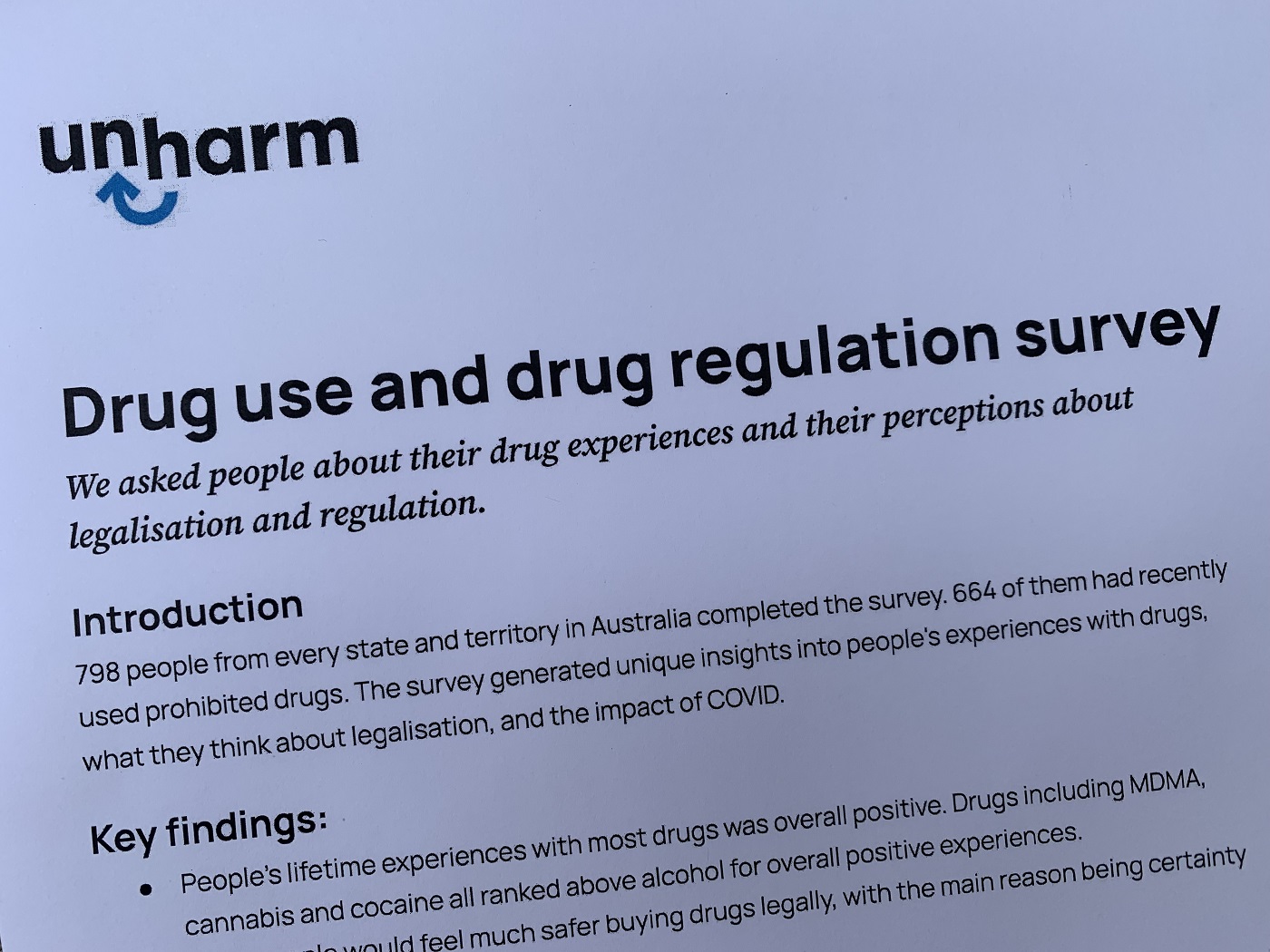
Unharm has released a groundbreaking report revealing important new insights into how Australians access, consume and experience drugs today.
Unharm 2021 Drug Use and Drug Regulation Survey – Press Release November 1 2021
Will Tregoning
1.11.21
Unharm has today released a groundbreaking report which reveals important new insights into how Australians access, consume and experience drugs today.
Our report presents survey findings by 798 respondents from across every state and territory in Australia. The overwhelming majority of respondents (83 %) had recently used prohibited drugs. The survey generated unique insights into people’s experiences with drugs, what they think about legalisation, and the impact of COVID on use.
Our survey results disrupt the conventional narrative that only people on the fringes of mainstream society or risk-taking young people use drugs. More than two-thirds of survey participants were over the age of 30, and more than a third were over the age of 45. More than a quarter earned over $100,000.
Interestingly, our participants were far more likely to have had negative experiences using alcohol than many other illegal drugs.
The perceived probability of being caught with illegal drugs in Australia, according to our survey results, draws into question the impact of high arrest rates on drug consumption. The latest Illicit Drug Data report released by the ACIC revealed record numbers of drug user arrests.
Over the 10 year period where the ACIC recorded a 96% increase in arrests, the Australian Institute of Health and Welfare estimated that the number of people who used drugs in Australia went from 2,700,000 to 3,400,000. (Source – National Drug Strategy Household Survey, supplementary tables 4.9).
However, the majority of people surveyed by Unharm who recently used drugs think it’s very unlikely they will be caught. People in the lowest income bracket were much more likely to report being stopped and searched for drugs and charged with a drug-related offence. This suggests a relationship between income inequality and criminalisation in Australia.
Unharm CEO, Dr Will Tregoning said:
‘As a parent myself I understand that many parents are concerned about their kids taking drugs, especially when the contents of those drugs might be unknown. The positive news in our survey is that a broad range of people use drugs recreationally and safely.
‘As we’ve seen, people continue to use drugs, including the prohibited ones. If we could have a more realistic response to drug use, we could make people safer including young people who decide to try drugs for the first time.’
Unharm’s survey results show that fear mongering tactics and the abstinence approach – used to highlight the worst harms of drug use – do not reflect the majority of people’s experiences.
Our survey results also found that people’s lifetime experiences with most drugs was overwhelmingly positive, with drugs including MDMA, cannabis and cocaine all ranked above alcohol for overall positive experiences.
The report also confirms that people who use drugs care about safety, and 79% would feel much safer if they could access drugs which are currently illegal via a pharmacy or a dedicated shop. The main reason was certainty about what is in the product.
Unharm CEO, Dr Will Tregoning, says there is clear demand for a better regulated market as part of a realistic response to drug use that gives people the agency and information they need to make good choices.
Media contact: Dr Will Tregoning, Unharm CEO, 0402 409 753, [email protected]
Additional findings include:
- Tobacco and alcohol ranked lower for overall positive experience than drugs which under the law are illegal to buy and use.
- A majority of people supported a legal, regulated market for all drug types.
- For all drugs except cannabis, people were more likely to support a legal, regulated market with distinct rules for supply for each drug than they were to support legalising just personal use.
- For drugs other than heroin, people who recently consumed prohibited drugs mostly said those drugs were easy to get.
- Some people were finding it harder to get some prohibited drugs because of COVID-19, particularly MDMA
- Cannabis, alcohol, heroin and tobacco were the drugs that people most often said they had increased their use of during COVD-19. MDMA, ketamine and cocaine were the drugs that people most often said they had decreased use of.
- Most people who had consumed prohibited drugs in the previous 12 months thought it would be very unlikely they would be caught by police.
Dr Will Tregoning: ‘Drug use happens in all parts of society – certainly including the well off. More people are being arrested than ever for using drugs, but it’s poorer people who are most likely to end up with a criminal charge. Not only is this system failing to keep people safe, it’s also deeply unfair.’
To review the survey results, access the full report here: https://bit.ly/3mhb0u6
Media contact: Dr Will Tregoning, Unharm CEO, 0402 409 753, [email protected]
Sign up
Sign up for movement news and opportunities to get involved
We are building a movement to make drug use legal and safe in Australia so that everyone has a better chance to lead a healthy and happy life.